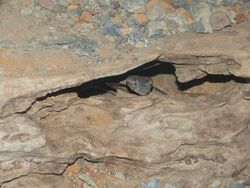Biology:Mixcoatlus melanurus
| Mixcoatlus melanurus | |
|---|---|

| |
| Scientific classification Error creating thumbnail: Unable to save thumbnail to destination
| |
| Domain: | Eukaryota |
| Kingdom: | Animalia |
| Phylum: | Chordata |
| Class: | Reptilia |
| Order: | Squamata |
| Suborder: | Serpentes |
| Family: | Viperidae |
| Genus: | Mixcoatlus |
| Species: | M. melanurus
|
| Binomial name | |
| Mixcoatlus melanurus (L. Müller, 1924)
| |
| Synonyms[2] | |
| |
- Common names: black-tailed horned pitviper.[3]
Mixcoatlus melanurus is a venomous pitviper species endemic to the mountains of southern Mexico. No subspecies are currently recognized.[4][5]
Description
Adults grow to between 37.5 and 50 centimetres (14 3⁄4 and 19 5⁄8 inches) in length and have a moderately stout build.[3] In Mexico, it is called a necazcoatl, from the Nahualt words necaztli and coatl which means "eared-serpent" referring to its "horns".
Geographic range
It is found in two Mexican states, southern Puebla and Oaxaca, at elevations of 1,600–2,400 m (5,200–7,900 ft). The type locality given is "Mexico".[2]
Conservation status
This species is classified as Endangered (EN) on the IUCN Red List of Threatened Species with the following criteria: B1ab(iii) (v3.1, 2001).[1] A species is listed as such when the best available evidence indicates that the geographic range, in the form of extent of occurrence, is estimated to be less than 5,000 km2 (1,900 sq mi), that estimates indicate it to be severely fragmented or known to exist at no more than 5 locations, and that a continuing decline has been observed, inferred or projected, in area, extent and/or quality of habitat. It is therefore considered to be facing a very high risk of extinction in the wild. In 2007 when it was last assessed, the population trend was down.[6]
Behavior
Terrestrial.[3]
References
- ↑ 1.0 1.1 Canseco-Márquez, L.; Campbell, J.A.; Ponce-Campos, P.; Muñoz-Alonso, A.; García Aguayo, A. (2007). "Mixcoatlus melanurus". The IUCN Red List of Threatened Species (IUCN) 2007: e.T64340A12772134. doi:10.2305/IUCN.UK.2007.RLTS.T64340A12772134.en. http://www.iucnredlist.org/details/64340/0. Retrieved 10 January 2018.
- ↑ 2.0 2.1 McDiarmid RW, Campbell JA, Touré T. 1999. Snake Species of the World: A Taxonomic and Geographic Reference, vol. 1. Herpetologists' League. 511 pp. ISBN:1-893777-00-6 (series). ISBN:1-893777-01-4 (volume).
- ↑ 3.0 3.1 3.2 Campbell JA, Lamar WW. 2004. The Venomous Reptiles of the Western Hemisphere. 2 volumes. Comstock Publishing Associates, Ithaca and London. 870 pp. 1500 plates. ISBN:0-8014-4141-2.
- ↑ Mixcoatlus melanurus at the Reptarium.cz Reptile Database. Accessed 13 December 2014.
- ↑ "Ophryacus melanurus". Integrated Taxonomic Information System. https://www.itis.gov/servlet/SingleRpt/SingleRpt?search_topic=TSN&search_value=586175. Retrieved 27 July 2008.
- ↑ 2001 Categories & Criteria (version 3.1) at the IUCN Red List. Accessed 27 July 2008.
Further reading
- Müller, L. 1924. Ueber neue oder seltene mittel- und südamerikanische Amphibien und Reptilien. Mitteilungen aus dem Zoologischen Museum in Berlin
11 (1): 75-93. (Trimeresurus melanurus, p. 92.)
External links
- Ophryacus melanurus at the Reptarium.cz Reptile Database. Accessed 27 July 2008.
Wikidata ☰ Q3015289 entry
 |


